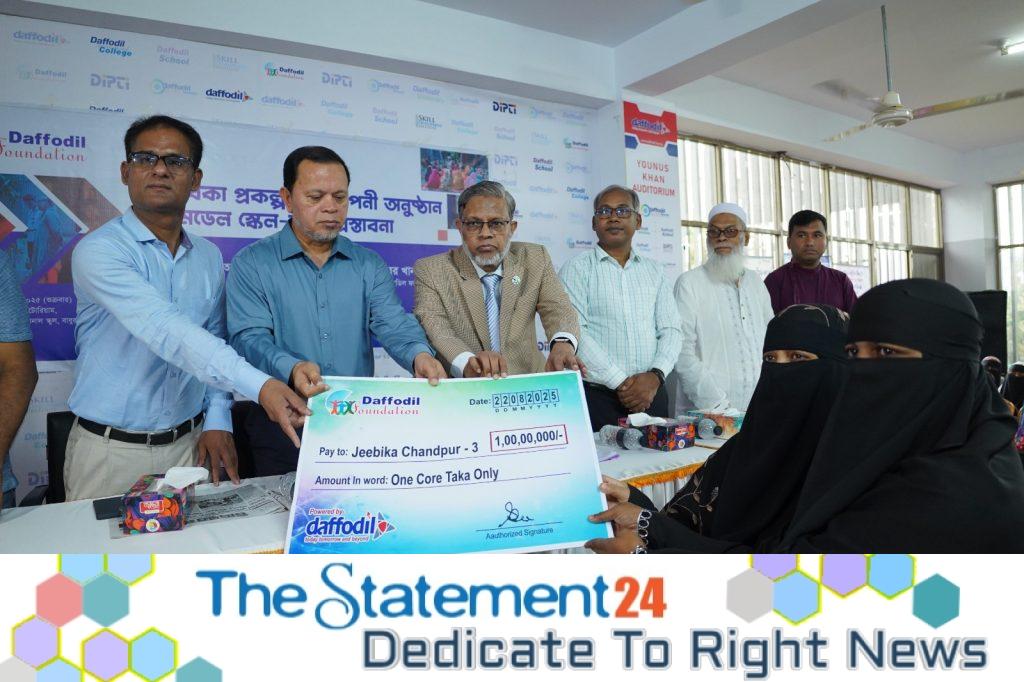
The closing ceremony of the “Jeebika Chandpur Project (Part-3)” implemented by Jeevika Chandpur in collaboration with Daffodil Foundation was held on August 22 (Friday)at the Yunus Khan Auditorium of Daffodil International School in Baburhat Model Town in Chandpur District.The Jeebika Chandpur Project, implemented by Daffodil Foundation, stands as a unique social development initiative that leverages a zakat-based economic model to reduce poverty, curb unemployment, empower women, and ensure access to healthcare, education, and sustainable livelihoods—opening a new horizon in humanitarian development.
Launched in March 2015, the project has covered 12000 beneficiaries of 2,500 families across Kalyanpur Union, Ashikati, Moishadi, Tarapur Chandi, and Ward-14 of Chandpur Municipality under Chandpur Sadar Upazila. Today, it has become a role model for sustainable social transformation by demonstrating the effective utilization of zakat in creating long-lasting positive changes in society.
The project is guided by the principle: “Zakat is not charity; it is a right.” Through interest-free capital, skills training, healthcare, and education, beneficiaries are being empowered both economically and spiritually to achieve self-reliance.
The closing ceremony of the third phase was presided over by Daffodil Foundation and Group Chairman Dr. Md. Sabur Khan, while Dr. Muhammad Abdul Majid, Chairman, Social Development Foundation (former Secretary and former Chairman, National Board of Revenue) was present as the chief guest. Chandpur Press Club President Rahim Badsha, Deputy Director of the Department of Social Services Mr. Md. Nazrul Islam, Assistant Director Billal Hossain Khandaker, Principal of Daffodil International College Shibli Ahmed, Principal of Daffodil International School Noor Khan, Project Director of Daffodil Institute of Social Sciences Mr. Jahangir Hossain were present as special guests. Abdullah Al Amin, Lecturer of Daffodil International College Baburhat Branch, delivered the welcome speech, while Md. Asadullah Khan, Project Manager.
While addressing as the chief guest Dr. Muhammad Abdul Majid said, “The Jeebeka” Project is a unique model of poverty alleviation and social development. It proves that with proper planning and management, beneficiaries not only get financial assistance but also gain confidence, skills and opportunities for a dignified life. This project is a shining example for Chandpur, which can act as a role model for the entire country. He further said, the changes that have been made in the field of sustainable livelihood, women’s empowerment and education through the project are truly commendable. Such initiatives play an important role in increasing the dignity and self-reliance of the society.
In the presidential address, Daffodil Foundation Chairman Dr. Md. Sabur Khan said, “Poverty is not a curse, it is a changeable condition. Sustainable development in society is possible through good governance of Islamic economy and proper application of Zakat. The livelihood project is a beacon of that possibility.”
He also said that the livelihood project is not only financial assistance, it is also a spiritual awakening, moral change and a new journey on the path of honorable life. The main goal of the project is to restore the confidence, skills and dignity of the beneficiaries. This initiative has set an example of a self-reliant and honorable life in the society.
According to the authorities, the livelihood project run by the Daffodil Foundation has been established as a bright model of human development, poverty alleviation and sustainable livelihood through a zakat-based financial system. The project has opened a new horizon in unemployment reduction, women empowerment, healthcare, education and social welfare.
Key Achievements of “Jeebika Chandpur Project:
- Against an initial capital of BDT 50 million, a revolving fund of BDT 1.83 billion has been utilized, enabling 2,500 families (11,586 individuals) to secure sustainable employment.
- Through 6,905 investments, 80% of families have achieved stable livelihoods, while 56% transitioned to sustainable income sources under an interest-free lifestyle.
- 47% of families have progressed from lower-income to middle-income levels, with monthly earnings rising to BDT 15,000–25,000.
Families collectively deposited BDT 30.5 million in savings to date. - During the COVID-19 pandemic, 1,150 families received food and cooked meals.
- 19,138 women and adolescent girls received life skills training, while 15,940 patients accessed free services at the Yunus Khan Health Center.
- 530 children enrolled in pre-primary education, and 504 transitioned to primary schools.
- 268 children and members received religious education through 7 Qur’an learning centers.
- Emergency operational support worth BDT 1.23 million provided to 85 individuals.
- Monthly food support extended to 81 vulnerable women, totaling BDT 4.63 million in assistance.
- 278 students received monthly scholarships; 91 students are currently continuing under this scheme.
Future Plan:
Daffodil Foundation aims to transform the Jeebika Chandpur Project into a national model for zakat-based humanitarian and sustainable development across Bangladesh. In the upcoming phase, an additional 1,200 families will be integrated into the program.
The Jeebika Chandpur Project is more than financial assistance—it is a journey of spiritual awakening, moral transformation, and the first step toward a life of dignity.

